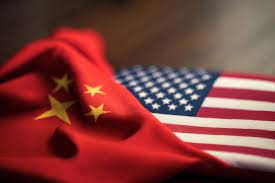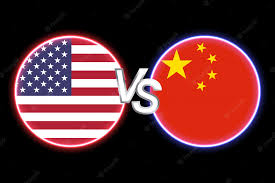The G7 summit, which recently concluded, witnessed the inclusion of a new item on its already packed agenda—artificial intelligence (AI). With rising concerns about the potential harm caused by AI, the discussion coincided with the United States’ efforts to restrict China’s access to critical technology.

For now, the United States seems to have the upper hand in the AI race. However, analysts believe that China could catch up in the coming years as AI solutions take time to be perfected.
Chinese internet companies are already making significant strides and, depending on the measurement of advancement, may be considered more advanced than their American counterparts, according to Kendra Schaefer, head of tech policy research at Trivium China.
While China demonstrates prowess in consumer adoption and a thriving internet sector, the United States maintains a notable advantage with Silicon Valley, the global entrepreneurial powerhouse.
Silicon Valley has given birth to tech giants like Google, Apple, and Intel, which have played instrumental roles in shaping modern life. Pascale Fung, director of the Center for Artificial Intelligence Research at the Hong Kong University of Science and Technology, attributes this advantage to the unique research culture in the United States.
American researchers often spend years improving technology without immediate product considerations—a luxury that doesn’t exist in most Chinese companies.
Furthermore, US investors have been supportive of the country’s research endeavors. In 2019, Microsoft pledged $1 billion to OpenAI, emphasizing the transformative potential of AI in addressing pressing global challenges, as stated by Microsoft CEO Satya Nadella.
China, on the other hand, benefits from its vast consumer base. With approximately 1.4 billion people, China’s population provides a rich source of data to enhance AI products.
Edith Yeung, a partner at the Race Capital investment firm, highlights the abundance of data and less stringent privacy regulations in China compared to the United States.
The prevalence of applications like WeChat, which serves various functions from messaging to tax filing, contributes to a wealth of information that can be leveraged for AI advancements.

While China’s tech community may seem to lag behind the United States, Lee Kai-Fu, a prominent figure in Beijing’s internet sector, argues otherwise.
In his book “AI Superpowers: China, Silicon Valley, and the New World Order,” Lee asserts that the fast-paced and competitive environment in China, where copying is accepted and speed is paramount, fuels the development of agile entrepreneurs.
This stands in contrast to Silicon Valley, where copying is stigmatized and companies can rely on a single original idea or fortunate breakthrough.
Over the past few decades, China has successfully shifted its economy from a manufacturing-based model to one driven by technology and innovation. Chinese internet companies and high-end designs have displayed considerable innovation, showcasing the country’s progress in consumer-driven sectors.
However, the full implications of China’s authoritarianism on the development of AI chatbots remain uncertain. Questions arise regarding the ability of Chinese chatbots to address sensitive topics or answer controversial questions about President Xi Jinping.
Nevertheless, the main concern lies in the US’s attempts to restrict China’s access to specialized technology, which could hinder China’s AI industry. Export controls on high-performing computer chips (semiconductors) create tension between the two nations, as these chips are vital for AI hardware and possess military applications.
While Chinese companies excel in consumer technology, the export restrictions aim to impede China’s advancement in advanced AI for military purposes.
To bridge the gap, China seeks to cultivate its own Silicon Valley—a research culture that attracts talent from diverse backgrounds.
While China has relied on domestic talent and individuals of Chinese heritage from overseas, fostering homogeneous cultural thinking has its limitations, according to Ms. Fung. China has implemented initiatives like the “Big Fund” to incentivize chip companies and close the gap.
However, Beijing’s increasing control over the sector and recent cases of corruption allegations create an environment of uncertainty.

The future of China’s AI industry remains to be seen as the messages conveyed through actions like the arrest of technology tycoon Zhao Weiguo reverberate within the sector.
Nevertheless, both the United States and China are determined to maintain their positions in the AI race, and the outcomes will shape the trajectory of global technological development.

